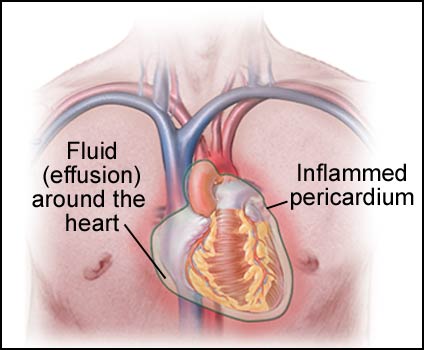
Pericarditis
Pericarditis is an inflammation of the pericardium. The pericardium is the thin layer of tissue that surrounds the heart in a “sac”. The pericardium contains a small amount of fluid. The pericardium and pericardial fluid serve a number of purposes, protecting and “lubricating” the heart’s surface as it beats (see fig. 1). There are many causes of pericarditis including infection, trauma and inflammatory conditions such as some types of arthritis. Chest discomfort is the most common sign of pericarditis. A pericardial effusion is an accumulation of fluid in the pericardial sac (see fig. 2).
Figure 1: Pericardium covering the heart.
Figure 2: Pericarditis with inflammation of the pericardium and fluid build-up around the heart.
Visit Medmovie.com Website for more information.

